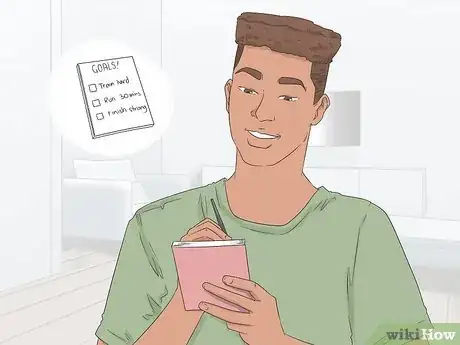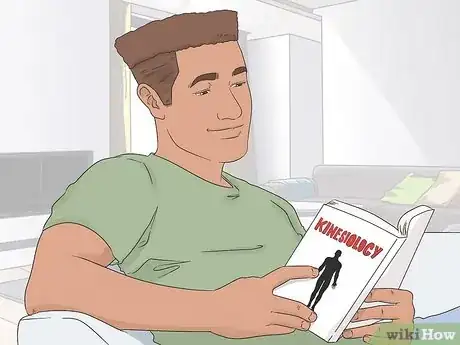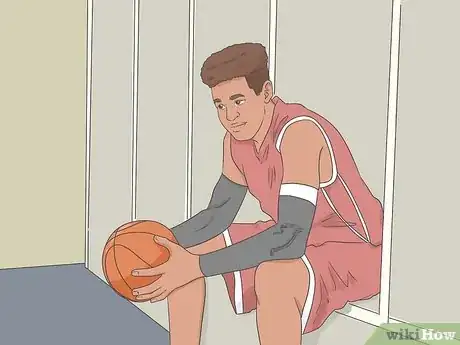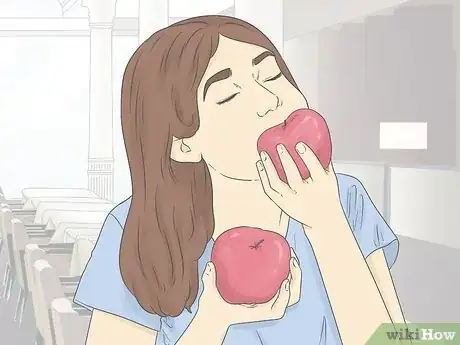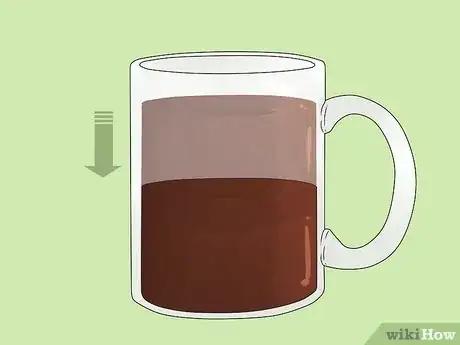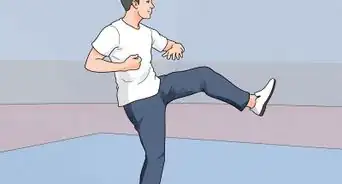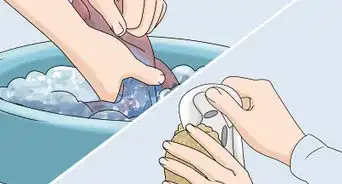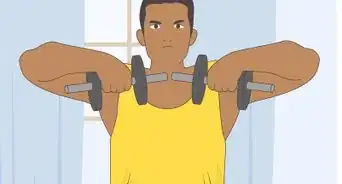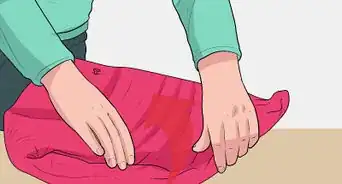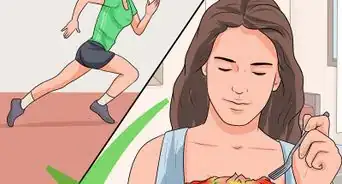This article was co-authored by Danny Gordon. Danny Gordon is an American College of Sports Medicine (ACSM) Certified Personal Trainer and Owner of The Body Studio for Fitness, a fitness studio based in the San Francisco Bay Area. With over 20 years of physical training and teaching experience, he has focused his studio on semi-private personal training. Danny received his Personal Trainer Certification from the California State University, East Bay and the American College of Sports Medicine (ACSM).
There are 19 references cited in this article, which can be found at the bottom of the page.
This article has been viewed 128,200 times.
Sports are a great way to stay physically active and have fun. If you do sports regularly, chances are you may want to get better at your favorite or even any activity you do, even if you don't compete. No matter what sport you play, you can help yourself improve your skills and performance through effective practice and maintaining a healthy lifestyle.
Steps
Employing Effective Practice Techniques
-
1Set your goals. Before you begin practicing to get better at the sport or sports of your choice, think about your goals. This can help you focus your training and give you something for which to work.[1]
- Your goals don't need to be anything lofty and they shouldn't be unattainable, which could make you quit.
- For example, if you are currently running a 10-minute mile, you could set a goal of getting down to 8 minute miles in six months. It can be easy to formulate a plan for training once you have a concrete goal.[2]
-
2Formulate a plan. It's easy to stick to any goals you have to get better at a sport if you formulate a reasonable plan. Your plan should include everything from training sessions times to specific drills or goals you have for each session. Remember to keep it reasonable, though. Gradual improvement will keep you motivated and not fatigue you to the point that you quit.[3]
- You can formulate plans with the help of sports magazines, coaches, trainers, or even friends.
- There are plans to help people attain their goals available in the media and on the web. Consider sticking with sources such as fitness sites or the sites of fitness magazines.
- Make sure to schedule at least one full day of complete and two if you need it.
- For example, if you want to get better at breaststroke in swimming, you might formulate a plan that includes swimming four days a week and incorporates drills that will specifically develop the leg and arm muscles you use for this stroke.
Advertisement -
3Train regularly. You cannot get better at sports if you do not train on a regular basis. Aim to train anywhere from 3-6 times per week, depending on your overall goals.
- You don't have to train for hours on end to get better at a sport. Even twenty minutes of target exercise can improve your skills as long as you do this regularly.
- Most people can improve with at least 150 minutes of moderate activity per week or 75 minutes of vigorous activity.[4]
- If you are generally more active, you can do more than the recommended amount of exercise per day. In addition, if you are training for endurance events such as a marathon, you may also exceed this suggestion.[5]
- Remember to pace yourself and increase your training schedule gradually. This can help minimize your risk for burnout.[6]
- You may want to check with your doctor before undertaking any significant increase in your fitness program.[7]
-
4Incorporate drills. Since most sports require developing and improving even the most basic skills, focus your training by incorporating drills. These can help you improve dramatically at the sport of your choice.
- Drills are every bit as important as strength and speed because they make your movements much more accurate.
- Drills can also improve skills in other sports you may play.
- You may want to identify drills specific to your sport of choice by asking coaches or even competitive athletes for their suggestions.
- For example, if you play basketball, you might want to do wind sprints to improve your pivoting ability and increase your endurance. Swimmers can use kickboards and pull buoys.
- Even practicing repetitive movements like serving or shooting baskets from different angles can really help you get better at sports.
-
5Enjoy the benefits of cross training. Doing the same sport daily can get a little boring. Consider cross-training, which can not only help you get better at your sport of choice, but also boosts your endurance and may also prevent injury.[8]
- Try and train at the sport at which you want to get better 3-4 days a week and cross train the other days.[9]
- Cross training can strengthen the muscles that you don't use in your sport of choice.[10]
- Cross training can rejuvenate and motivate you to do your sport of choice. It also helps refresh your brain.[11]
- You can use any sports to supplement your sport of choice, but you may want to choose something complementary to what you're doing. For example, if you are a runner, you may want to do some strength training, swimming, or even yoga to strengthen your arm muscles while stretching out your leg muscles.[12] Rock climbers may want to run, hike, or jog to use their leg muscles that don't get used as often.[13]
-
6Stretch your muscles. Although there are mixed opinions about the benefits of stretching, it can improve your range of motion. In turn, this may help your athletic performance and help minimize your risk of injury.[14]
- Stretching has additional benefits including: improved flexibility and increased blood flow to your muscles, both of which can also help you get better at sports.[15]
- You can do either specific stretching exercises or try more gentle forms of yoga such as hatha, restorative or yin yoga, all of which can help improve your athletic performance.
-
7Learn about kinesiology. Knowing about how the human body moves is something that can help you get better at your sport. By learning about the principles of kinesiology, or the study of movement, you may be able to improve significantly at your sport.
- Many colleges offer courses in kinesiology and though you can also find online courses.
- You can also learn about the principles of kinesiology by reading books or watching instructional videos.
-
8Study the movements of professionals. You may want to watch how professionals at your sport move. This visualization may give you some ideas for new methods to do your sport or drills you could do that may also help you get better.[16]
- Watch videos, visit matches or even read books and blogs to see how professionals do their sport.
- If you are near your opposing team or cannot get a video of them playing, visit one of their games.
-
9Build self-confidence. Having confidence in your skills and ability to improve them can also provide a foundation from improvement. By meeting realistic goals you have set, you can continue to maintain and build the confidence in your skills as an athlete.[17]
-
10Be a good team member- show up on time and be prepared. Don't just "go through the motions". Strive to get better in each drill that you do. Work as hard as you do when the coach is looking as when they're not. Be a good role model for others on the team.
-
11Listen to and respect your coaches. They know what they're talking about and can really help you work on your game if you let them. Most coaches are willing to work with you on specific skills or tell you in which areas you need to improve in. Don't be afraid to ask!
Boosting Your Training through Healthy Lifestyle
-
1Fuel with proper nutrition. Eating a diet rich in vitamins and nutrients can help fuel your training sessions and in turn help you get better at your sport. Foods that have moderate amounts of fat and are high in complex and simple carbohydrates are good choices to fuel your workouts.[20]
- Stick to a diet of about 1,500-2,000 nutrient-rich calories a day, depending on how active you are.[21]
-
2Consume carbohydrates and proteins. You'll want to eat a healthy mixture of carbohydrates and proteins for optimal performance.[22] These can help fuel your workout and build your bones and muscles, which may help you get better at sports.[23]
- You want to eat both complex and simple carbohydrate, which your body can burn for fuel.[24] Some examples of complex carbohydrates are: whole grain pastas, bagels, breads, and rice.[25] Soft drinks, jams, jellies and candies are examples of simple carbohydrates.[26]
- You need to eat some carbohydrates if you are exercising for more than an hour. Eat something small like an English muffin with jelly or a cup of yogurt. You can also have one cup of 100% fruit juice.[27] You'll also need to replenish carbs after a workout with similar foods.[28]
- Protein helps muscles grow and tissues repair, which may help you get better at a sport. You can get protein through lean meats and dairy.[29]
-
3Eat enough vitamins and nutrients. A key part of boosting your training is getting enough vitamins and nutrients to maintain your health. If you eat foods from the five food groups daily, you should be able to get enough nutrients. The five food groups are: fruits, vegetables, grains, proteins, and dairy.[30]
- Eat 1-1.5 cups of fruit per day, including examples like raspberries, blueberries, or strawberries.[31]
- Eat 2.5-3 cups of vegetables per day, including examples such as broccoli, asparagus, or peppers.[32] Make sure to vary the vegetables you choose so that you get a range of nutrients.
- Eat around 5-8 ounces of grains per day, of which ½ should be whole grains. Foods like brown rice, whole wheat pasta or bread, and oatmeal contain complex carbohydrates to fuel your training.[33]
- Take in 5-6.5 ounces of protein per day.[34] Lean meats like beef, pork, or poultry; cooked beans; eggs; peanut butter; or nuts and seeds all contain protein. Protein helps build and repair muscle.[35]
- Drink or eat 2-3 cups of dairy daily.[36] Dairy products including yogurt, milk, cheese, or even ice cream can help you build and maintain strong bones as muscles.[37]
-
4Hydrate properly. Maintaining proper hydration can help your body function optimally, which in turn can improve your athletic performance. Make sure you get sufficient liquids every day to boost your regular training.[38]
- Women should drink at least nine cups of water a day and men should aim for 13 cups. If you are very active, however, you may need up to 16 cups of water per day to maintain your hydration.[39]
- You can stay hydrated with different liquids such as tea, juice, soda, or even broth.
-
5Reduce your intake of caffeine, alcohol, and drugs. If you're trying to get better at a sport, considering reducing your intake of caffeine and alcohol consumption. You should also avoid drugs, including performance-enhancing substances. All three can affect your athletic performance.
- Most adults can drink about 400mg, or four cups of coffee, daily.[40]
- Women should no more than two to three alcohol units per day and men only three to four alcohol units. A bottle of wine, for example, has nine to ten units of alcohol.
-
6Practice good resting habits. If you want to get better at a sport, rest is a key component.[41] It allows your body and brain time to recharge and rebuild muscles and tissues.[42] Rest also helps your body relax and handle stress.[43]
- Get 7-9 hours of sleep every night.[44]
- Insufficient sleep can decrease your ability to perform athletically, which can undermine efforts to improve.[45]
- Short naps of 20-30 minutes can help overcome fatigue related to sports.[46]
- Make sure to build in at least one full rest day per week and two if necessary.[47] If you like, you can have one day of “active recovery” where you do some light activity like bike riding or walking.
-
7Unwind with a massage. Although there is little scientific evidence that massage can help you get better at a sport, you may still want to get an occasional massage.[48] Massage has other benefits that may help you get better. These include decreasing your heart rate, and relaxing and stretching out tight muscles.
- There are many different styles of massage and you should choose one that you enjoy. You may find that myofascial release, deep tissue and Swedish massage help your performance the most.
- You can seek out a massage therapist online or ask your doctor, trainer, or a friend for a recommendation.[49]
Expert Q&A
Did you know you can get expert answers for this article?
Unlock expert answers by supporting wikiHow
-
QuestionWhat can I do to improve my skills in sports?
 Danny GordonDanny Gordon is an American College of Sports Medicine (ACSM) Certified Personal Trainer and Owner of The Body Studio for Fitness, a fitness studio based in the San Francisco Bay Area. With over 20 years of physical training and teaching experience, he has focused his studio on semi-private personal training. Danny received his Personal Trainer Certification from the California State University, East Bay and the American College of Sports Medicine (ACSM).
Danny GordonDanny Gordon is an American College of Sports Medicine (ACSM) Certified Personal Trainer and Owner of The Body Studio for Fitness, a fitness studio based in the San Francisco Bay Area. With over 20 years of physical training and teaching experience, he has focused his studio on semi-private personal training. Danny received his Personal Trainer Certification from the California State University, East Bay and the American College of Sports Medicine (ACSM).
Certified Fitness Coach
-
QuestionShould I join a sports club if I'm not good at sports?
 Community AnswerIf you want to join a club, make sure that you feel confident that you are good at that particular sport. You must make sure that you are devoted to that sport and not mind lots of practices and games. Club sports are year-round, so you have to be committed to it.
Community AnswerIf you want to join a club, make sure that you feel confident that you are good at that particular sport. You must make sure that you are devoted to that sport and not mind lots of practices and games. Club sports are year-round, so you have to be committed to it. -
QuestionHow can I train myself to become a better runner?
 Community AnswerTry joining a swimming club as that will help you get stronger and flexible which can really help in running.
Community AnswerTry joining a swimming club as that will help you get stronger and flexible which can really help in running.
Warnings
- Listen to your body; when it tells you that you should rest. There is nothing wrong with taking an extra day to rest if you are sick or your body simply needs it.[50]⧼thumbs_response⧽
References
- ↑ https://www.usta.com/Improve-Your-Game/Sport-Science/117746_Sports_Psychology_Mental_Skills_for_Achieving_Optimum_Performance/
- ↑ https://www.usta.com/Improve-Your-Game/Sport-Science/117746_Sports_Psychology_Mental_Skills_for_Achieving_Optimum_Performance/
- ↑ https://www.usta.com/Improve-Your-Game/Sport-Science/117746_Sports_Psychology_Mental_Skills_for_Achieving_Optimum_Performance/
- ↑ http://www.mayoclinic.org/healthy-lifestyle/fitness/basics/fitness-basics/hlv-20049447
- ↑ http://www.mayoclinic.org/healthy-lifestyle/fitness/basics/fitness-basics/hlv-20049447
- ↑ http://www.mayoclinic.org/healthy-lifestyle/fitness/basics/fitness-basics/hlv-20049447
- ↑ http://www.mayoclinic.org/healthy-lifestyle/fitness/basics/fitness-basics/hlv-20049447
- ↑ http://www.runnersworld.com/workouts/eight-benefits-of-cross-training
- ↑ http://www.runnersworld.com/workouts/eight-benefits-of-cross-training
- ↑ http://www.runnersworld.com/workouts/eight-benefits-of-cross-training
- ↑ http://www.runnersworld.com/workouts/eight-benefits-of-cross-training
- ↑ http://www.runnersworld.com/workouts/eight-benefits-of-cross-training
- ↑ http://www.runnersworld.com/workouts/eight-benefits-of-cross-training
- ↑ http://www.mayoclinic.org/healthy-lifestyle/fitness/in-depth/stretching/art-20047931
- ↑ http://www.mayoclinic.org/healthy-lifestyle/fitness/in-depth/stretching/art-20047931
- ↑ https://www.usta.com/Improve-Your-Game/Sport-Science/117746_Sports_Psychology_Mental_Skills_for_Achieving_Optimum_Performance/
- ↑ https://www.usta.com/Improve-Your-Game/Sport-Science/117746_Sports_Psychology_Mental_Skills_for_Achieving_Optimum_Performance/
- ↑ https://www.usta.com/Improve-Your-Game/Sport-Science/117746_Sports_Psychology_Mental_Skills_for_Achieving_Optimum_Performance/
- ↑ https://www.usta.com/Improve-Your-Game/Sport-Science/117746_Sports_Psychology_Mental_Skills_for_Achieving_Optimum_Performance/
- ↑ https://www.nlm.nih.gov/medlineplus/ency/article/002458.htm
- ↑ ifestyle/nutrition-and-healthy-eating/in-depth/how-to-eat-healthy/art-20046590
- ↑ https://www.nlm.nih.gov/medlineplus/ency/article/002458.htm
- ↑ https://www.nlm.nih.gov/medlineplus/ency/article/002458.htm
- ↑ https://www.nlm.nih.gov/medlineplus/ency/article/002458.htm
- ↑ https://www.nlm.nih.gov/medlineplus/ency/article/002458.htm
- ↑ https://www.nlm.nih.gov/medlineplus/ency/article/002458.htm
- ↑ https://www.nlm.nih.gov/medlineplus/ency/article/002458.htm
- ↑ https://www.nlm.nih.gov/medlineplus/ency/article/002458.htm
- ↑ https://www.nlm.nih.gov/medlineplus/ency/article/002458.htm
- ↑ https://www.choosemyplate.gov/
- ↑ http://www.choosemyplate.gov/fruit
- ↑ https://www.choosemyplate.gov/eathealthy/vegetables
- ↑ http://www.choosemyplate.gov/grains
- ↑ http://www.eatright.org/resource/health/weight-loss/tips-for-weight-loss/women-get-nutrients-while-cutting-calories
- ↑ http://www.eatright.org/resource/health/weight-loss/tips-for-weight-loss/women-get-nutrients-while-cutting-calories
- ↑ http://www.choosemyplate.gov/dairy
- ↑ http://www.choosemyplate.gov/dairy
- ↑ https://www.nlm.nih.gov/medlineplus/ency/article/002458.htm
- ↑ http://www.mayoclinic.org/healthy-lifestyle/nutrition-and-healthy-eating/in-depth/water/art-20044256?pg=2
- ↑ http://www.mayoclinic.org/healthy-lifestyle/nutrition-and-healthy-eating/in-depth/caffeine/art-20045678
- ↑ https://www.psychologytoday.com/blog/the-power-rest/201007/improve-sports-performance-get-the-right-rest
- ↑ https://www.psychologytoday.com/blog/the-power-rest/201007/improve-sports-performance-get-the-right-rest
- ↑ https://www.psychologytoday.com/blog/the-power-rest/201007/improve-sports-performance-get-the-right-rest
- ↑ https://www.psychologytoday.com/blog/the-power-rest/201007/improve-sports-performance-get-the-right-rest
- ↑ https://www.psychologytoday.com/blog/the-power-rest/201007/improve-sports-performance-get-the-right-rest
- ↑ http://healthysleep.med.harvard.edu/healthy/getting/overcoming/tips
- ↑ https://www.psychologytoday.com/blog/the-power-rest/201007/improve-sports-performance-get-the-right-rest
- ↑ http://www.ncbi.nlm.nih.gov/pmc/articles/PMC2953308/
- ↑ http://life.gaiam.com/article/how-relieve-muscle-tension
- ↑ https://www.psychologytoday.com/blog/the-power-rest/201007/improve-sports-performance-get-the-right-rest
About This Article
Becoming better at a sport requires hard work, but if you stay dedicated you can make it happen! The most important thing to remember is to stay positive. Everyone makes mistakes, but focusing on the ways you’re improving rather than your flaws will boost your confidence and help you do better. No matter how often you play, you should always remember to have fun! If you’re part of a sports team, make sure to talk to your coach regularly and practice between 3-6 times a week. To learn what you should eat and drink to boost your training, read on!
